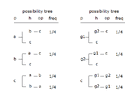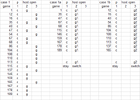Naive or lack of experience or both! She believes the probability of each door to literally be 1/M, and as the doors are opened revealing no car, their contribution is transferred to the remaining doors, finally to #777,777, but not to the door containing the car!
No, she's correct. You are wrong. But you'd best stay clear of casinos.
Just another reason for my personal philosophy,
'There are no experts, only some people with more experience than others'.
And you clearly need more experience, because you are wrong. As explained by numerous people in numerous different ways.
Those 1000's who disagreed with her are on my side.
And, unfortunately for you, everyone who agrees with
her is correct.
Look, you're asserting that swapping after the host has revealed an empty door (or a goat) doesn't increase your chances of winning, right? That once the host has opened that door you have a 50:50 chance of winning?
And you agree that when you pick a door at the start, you have a 1/3 chance of winning?
Okay. What you're saying is that if you
don't swap then, once the host has revealed a goat, you should win 50% of the time.
So try it. Play 100 games. Pick a door and
don't swap. Open one of the other doors that is empty (or has a goat) but
don't swap.
Tell us the results.
Gain some of your much-loved experience, and be astounded when the more games you play, the more your win ratio trends toward 33.3%.
Don't start with the outcome and work back, but start with each game being when you pick one of the 3 doors. Because that's where (afaict) you are erring in your analysis.
Here are the options (doors are C, G1, G2):
Pick C - don't swap - win
Pick G1 - don't swap - lose
Pick G2 - don't swap - lose
You can't decide to pick the car (C) more times than the others - it is a random choice by you, so each of those options will be picked 1/3 of the time (or at least trend toward that the more you play): you will pick C, G1, and G2 each 1/3 of the time.
Your fallacious analysis starts with the possible variations of game (there being 2 with "Pick C"), not with the initial choice. That is your mistake, since you don't take into account the different frequency of those 4 variations.



